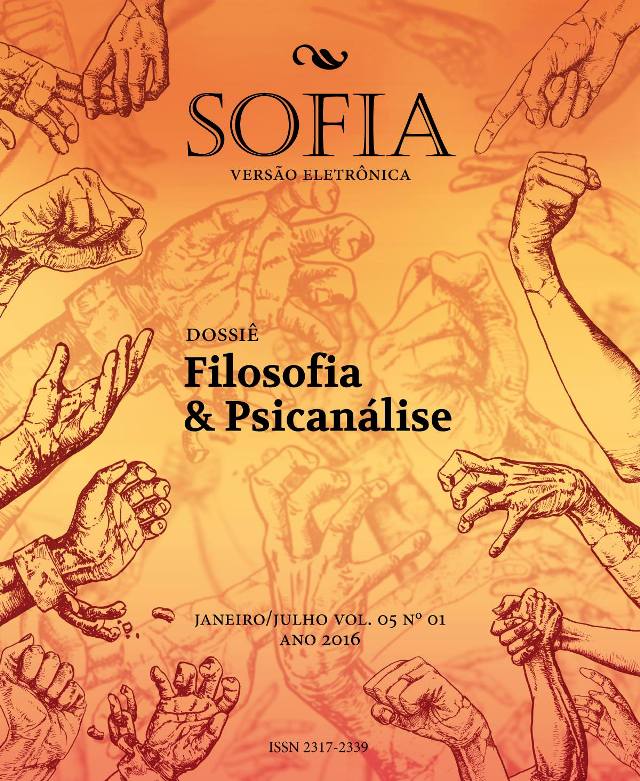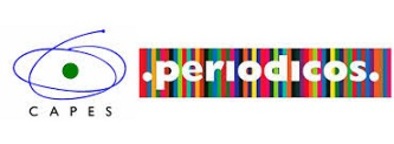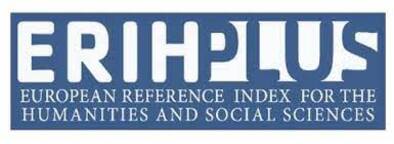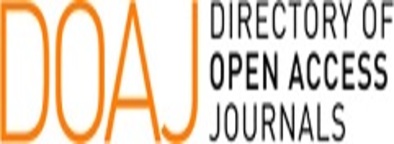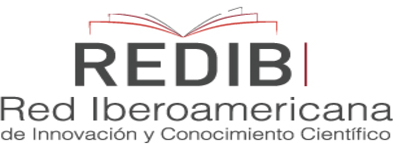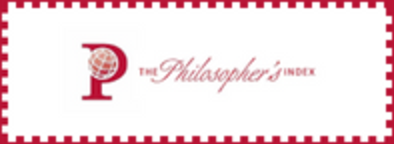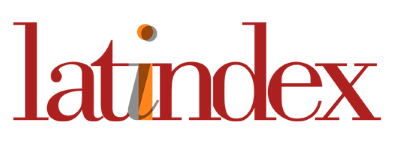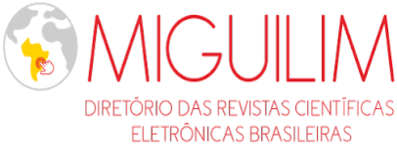A ciência do sonho de Lacan; Lacan's science dream
DOI:
https://doi.org/10.47456/sofia.v5i1.11597Palavras-chave:
Lacan, epistemologia, filosofia francesa, morfologia, gramática da psicanálise, epistemology, french philosophy, morphology, grammar of psychoanalysisResumo
Proponho analisar nos termos de uma teoria das pressuposições e da teoria dos atos de fala o artigo de Lacan intitulado “A Ciência e a Verdade”, publicado originalmente em 1966. Neste sentido, o principal interesse do artigo é contribuir com uma discussão epistemológica atual da psicanálise mediante um exemplo bem localizado de visão da ciência publicado há quase meio século.
Abstract
This article analyzes one of the most known texts written and published by Lacan in his Écrits in 1966, entitled “Science and Truth”. This analysis is made through a sort of combination of theory of presuppositions and theory of speech acts. The main focus is to evoke a localized epistemological discussion from almost a half century ago to contribute to a present view of the relationship between psychoanalysis and science.
Referências
AMACHER, Peter. Freud’s neurological education and its influence on psychoanalytic theory. Psychological issues IV (4), 9-93, 1965.
CANGUILHEM, Georges. Qu’est-ce que la psychologie? In Etudes d’histoire et de philosophie des sciences Paris: Vrin, p. 365-381, 1983.
CAVELL, Marcia. The psychoanalytic mind. From Freud to Philosophy. Cambridge, MA: Harvard University Press, 1996.
DUFRESNE, Todd. Against Freud. Critics talk back. Stanford: Stanford University Press, 2007.
FORRESTER, John. Dispatches from the Freud wars. Psychoanalysis and its passions. Cambrige, MA: Harvard University Press, 1997.
FOUCAULT, Michel. The order of things. An archaeology of human sciences. London: Routledge, 2005
FRAENKEL, Abraham; BAR-HILLEL, Yehoshua.; LEVY, Azriel. Foundations of set theory. 2nd revised edition. Amsterdam: Elsevier, 1973.
FREUD, Sigmund. The interpretation of dreams. (A. Brill, Trans.). New York: Wordsworth Editions, 1997 (Original work published in 1900).
GOMEZ, Lavinia The Freud wars. An introduction to the philosophy of psychoanalysis. London: Routledge, 2005.
GLYNOS, Jason & STAVRAKAKIS, Yannis. “Postures and impostures: on Lacan’s style and use of mathematical science”. In: ____ (eds.). Lacan & science. London: Karnak Books Ltd., 2002, pp. 207-229.
KOJÈVE, Alexandre. Introduction to the reading of Hegel. Lectures on the Phenomenology of Spirit assembled by Raymond Queneau. (J. Nichols, Trans.). Ithaca: Cornell University Press, 1969.
KOYRÉ, Alexandre. From the closed world to the infinite universe. Baltimore: The Johns Hopkins Press, 1957
LACAN, Jacques. Les complexes familiaux dans la formation de l’individu. In Autres écrits. Paris: Editions du Seuil, 2001a, p. 23-84.
LACAN, Jacques. Problèmes cruciaux pour la psychanalyse. In Autres écrits. Paris: Editions du Seuil, 2001b, p. 199-202.
LACAN, Jacques. La logique du fantasme. In Autres écrits. Paris: Editions du Seuil, 2001c, pp. 323-328.
LACAN, Jacques. Télévision. In Autres écrits. Paris: Editions du Seuil, 2001d, pp. 509-546.
LACAN, Jacques. Écrits. (B. Fink, Trans.). New York: W. W. Norton & Co., 2005
LACAN, Jacques. Science and truth. In Écrits. (B. Fink, Trans.). New York: W. W. Norton & Co. 2005a, p. 726-745.
LACAN, Jacques. The instance of the letter in the unconscious, or reason since Freud. In Écrits. (B. Fink, Trans.). New York: W. W. Norton & Co., 2005b, p. 412-441.
LACAN, Jacques. The mirror stage as formative of the I function as revealed in psychoanalytical experience. In Écrits. Translated by Bruce Fink. New York: W. W. Norton & Co. 2005c, p. 75-81.
LACAN, Jacques. The function and field of speech and language in psychoanalysis. In Écrits. (B. Fink, Trans.). New York: W. W. Norton & Co. 2005d, p. 197-268.
LACAN, Jacques. The subversion of the subject and the dialectic of desire in the Freudian unconscious. In Écrits. (B. Fink, Trans.). New York: W. W. Norton & Co. 2005e, p. 671-702.
LEBRUN, Gerard.. L’Idée d’Epistemologie. In: Manuscrito: Revista Internacional de Filosofia 1 (1), 1977, p. 7-21.
LÉVI-STRAUSS, Claude. The effectiveness of symbols. In Structural anthropology (pp. 186-205). (C. Jacobson, Trans.). New York: Basic Books, 1963.
MERLEAU-PONTY, Maurice. Phénoménologie de la perception. Paris: Éditions Gallimard, 1945.
MEYER, Catherine. (ed.) Le livre noir de la psychanalyse. Vivre, penser et aller mieux sans Freud. Paris: Éditions des Arènes, 2005.
MILLER, Jacques.-Allain (ed.) L’Anti-livre Noir de la psychanalyse. Paris: Editions du Seuil, 2006.
POLITZER, Georges. Critique des fondements de la psychologie. La psychologie et la psychanalyse. Paris: Editions Rieder, 1928.
RABATÉ, Jean- Michel. Lacan’s turn to Freud. In The Cambridge companion to Lacan. Cambridge: Cambridge University Press, 2003, p. 1-24.
RICOEUR, Paul. De l’interprétation. Essai sur Freud. Paris: Éditions du Seuil, 1965.
ROUDINESCO, Elisabeth. Jacques Lacan. (B. Bray, Trans.). New York: Columbia University Press, 1997.
SARTRE, Jean-Paul. L’être et le néant. Essai d’ontologie phénoménologique. Paris: Éditions Gallimard, 1943.
SHOOK, John & MARGOLIS, Joseph (eds.). A companion to Pragmatism. Malden, MA: Blackwell Publishing Ltd., 2006.
SOKAL, Alan & BRICMONT, Jean. Intellectual impostures: Postmodern philosophers’ abuse of science. London: Profile Books, 1998.
Downloads
Publicado
Edição
Seção
Licença
Copyright (c) 2016 Sofia

Este trabalho está licenciado sob uma licença Creative Commons Attribution-NonCommercial-NoDerivatives 4.0 International License.
Dada a política de acesso público da revista, o uso dos textos publicados é gratuito, com a obrigação de reconhecer a autoria original e a primeira publicação nesta revista. Os autores das contribuições publicadas são inteiramente e exclusivamente responsáveis por seus conteúdos.
I Os autores autorizam a publicação do artigo nesta revista.
II Os autores garantem que a contribuição é original e assumem total responsabilidade pelo seu conteúdo em caso de impugnação por terceiros.
III Os autores garantem que a contribuição não está sob avaliação em outra revista.
IV Os autores mantêm os direitos autorais e concedem à revista o direito de primeira publicação, sendo o trabalho licenciado sob uma Licença Creative Commons Atribuição-BY.
V Os autores são autorizados e incentivados a divulgar e distribuir seu trabalho on-line após a publicação na revista.
VI Os autores dos trabalhos aprovados autorizam a revista a distribuir seu conteúdo, após a publicação, para reprodução em índices de conteúdo, bibliotecas virtuais e similares.
VII Os editores reservam o direito de fazer ajustes no texto e adequar o artigo às normas editoriais da revista.

